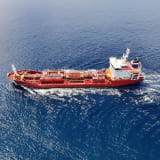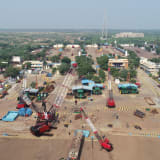
Last week marked a significant milestone as the United States and Japan revealed plans for a substantial upgrade to their security alliance, the most significant since the treaty’s inception in 1960. This heightened cooperation between Japan and the USA, combined with increasing interest from investment firms in the shipyard business, could have significant longer-term implications for Japan’s ship construction industry.
Notably, shipyards such as Japan Marine United (JMU), Mitsubishi Heavy Industries (MHI), Kawasaki Heavy Industries (KHI), and Mitsui Engineering & Shipbuilding (MES) have a longstanding reputation for constructing defence ships, including destroyers, submarines, and patrol/surveillance vessels.
The plans for the extensive upgrade to the security alliance between Japan and the USA signal a deeper cooperation in defence-related matters between both countries. As a result, Japanese shipyards specializing in defence vessels may witness heightened demand for their services. The imperative for seamless collaboration between the US and Japan in response to perceived threats in the region, particularly from China, underscores the importance of robust defence capabilities, further fuelling demand for defence ship construction.
Amid evolving global security dynamics, Western investors are increasingly focusing on the defence industry, particularly shipyards, anticipating a surge in defence ship construction. Major US investment firm Carlyle’s negotiations for a potential investment in ThyssenKrupp Marine Systems (TKMS), a leading German naval vessel manufacturer, exemplify this trend. This strategic move aligns with TKMS’s goal of capitalizing on the rising global demand for submarines and naval vessels. Additionally, in the Philippines, Cerberus, an American fund, recently acquired the former site of HHIC Philippines (Subic Shipbuilding) and leased a portion to the Philippines Navy for naval ship maintenance. The growing interest from investment firms in the shipyard business presents opportunities for Japanese shipbuilders to secure additional capital for expansion and modernization. This influx of capital could be utilized by shipbuilders to upgrade their facilities, invest in advanced technologies, and enhance their competitiveness not only in defence ships but also in commercial ship construction on a global scale.
As geopolitical tensions evolve, there is a growing emphasis on enhancing naval capabilities not only in Japan but also in other regions, including Europe and the USA. Collaborative efforts between Japan and other nations in joint defence projects or technology-sharing initiatives could further bolster the prospects for Japanese shipbuilders in the international defence market.
In conclusion, the strengthened alliance between Japan and the USA, coupled with growing interest from investment firms, presents promising opportunities for the defence ship construction business in Japan. Japanese shipyards are well-positioned to meet the evolving defence requirements of not only Japan but also other allied nations worldwide. However, in the medium term, as defence contracts take precedence due to strategic security concerns, there may be potential limitations in berth availability for commercial shipbuilding projects. The enduring impact of these dynamics on Japan’s commercial ship construction hangs in the balance, awaiting the verdict of time.
By Eugene Quek, Partner and Head of Projects in Japan
Articles
You may also be
interested in
View allGet in touch
Contact us today to find out how our expert team can support your business













